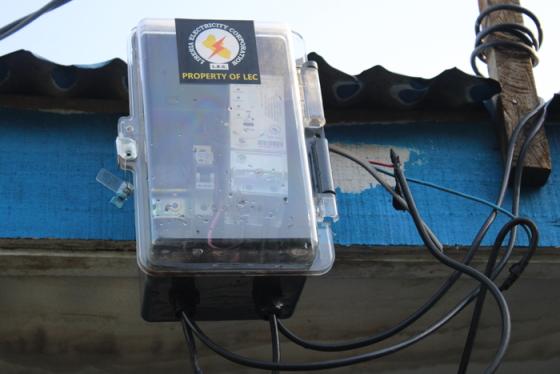Liberia: LEC Denies Meter Shortage Rumors

--But LEC's Meter Coordinator blames the lackadaisical attitudes of some customers for not receiving meters.
The Liberia Electricity Corporation (LEC) has claimed that the non-delivery of meters to some paying customers is not the fault of the company.
According to Ernest Mendee, the company's General Coordinator for Metering, LEC is not in short supply of meters but the delay in delivering meters to some paying customers is down to them not answering phone calls while others provided inactive numbers.
“Customers who did not pick up their phones can come back and log in again before we can redeliver the meters,” Mendee said. “Some numbers are off, some probably changed their numbers, and maybe some phones got stolen. This makes it hard for us to call them when we call to find their location.”
Mendee’s clarification comes after some customers who were disconnected by the LEC power theft task force for illegal connection have begun reconnecting themselves on grounds that they have not received the meters they paid for, leading them to take matters into their own hands.
These desperate customers, fully aware that their actions are illegal, are blaming the power company for pushing them into said path.
According to them, if their meters had been provided as agreed upon, they were not going to go back to illegal connections after voluntarily participating in the LEC campaign to get rid of power theft, which is the number of problems hampering the company's profitability.
“I tell you for free, nobody wants to get involved with power theft but LEC's failure to do the right thing is pushing people," said Timothy Messah.
"We pay for our meters after being caught engaging in poverty theft. Meters were the same reason we were engaged in the illegal act in the first place. But LEC is yet to change," Messah said
. "You can't have people wanting to do the right thing and yet you're discouraging their efforts. At this point, LEC should not be experiencing meter shortages knowing the demand for current is high among the people. "
Messah noted that a lot of people returned to their previous illegal behavior after waiting for a considered period to get meters which are not forthcoming.
He and others people were caught after the power company established a task force to combat power theft in Montserrado, the country's most populated county.
Led by former Monrovia City Mayor, Mary Broh, the task force generated over US$1.35 million in revenue from issuing fines and reconnections, surpassing their benchmark.
The campaign was anchored on the voluntary confession of those who were involved in power theft. The LEC would in return forgo
prosecution since power theft is a criminal offense for fine and legal connection.
The LEC was charging US $22 for a meter, which was paid along with a power theft fine of US$50 for households, US$100 for small businesses, and US$500 for large corporations. Lastly, US$30 worth of current was expected to be paid for as part of the fine package.
But Esther Johnson and numerous other customers are claiming that despite paying all necessary fees since January, they have yet to be reconnected. The reason would be found in Mendee's explanation that the power company has ended its mass connection programs.
“Firstly, when we started, we were doing mass connections, where we go to the field, collect the customer information that we have on our data, and serve the customer from a system called the drug fund, where all of the customers who paid have their information, the amount they paid, how many meters they paid for, their names, and we served them."
"That process ended in November,” said Mendee. "Folks were trooping in daily to pay the fines and get legally reconnected. Because of the fast pace of the exercise, the team received a lot of support and cooperation from residents. "
According to Mendee, the team has installed a little over 13,000 meters in 10 communities in Paynesville since the exercise against power theft started last year.
The numbers however would have been more if all the customers accusing LEC of not providing them meters had been connected.
The issue of power theft, however, is a global problem as billions of dollars are lost every year, wherein electricity is distributed to customers but is never paid for.
In 2018 alone, LEC reported that it was losing about 60% of the electricity generated annually, and that monetary value then was an annual loss of about US$ 35 million.
At the launch of the anti-power theft task force, according to LEC's Acting Chief Executive Officer, Monie Captan, the national grid operator was losing nearly 50% of its production, or electricity, amounting to over US$48 million annually to power theft.
Captan, who is also LEC's Board Chair, made this revelation in 2022 when announcing the setup of the task force, which has not failed to live up to its effort.
Liberia is trying to rebuild its power sector, destroyed during a civil war that lasted from 1989 to 2003. The Mount Coffee hydroelectric plant, destroyed during the war and subsequently rebuilt with donor aid, generates a lot of electricity, but commercial losses (theft and unpaid bills) have been a thorn in the company's flesh while robbing the public utility of much-needed cash to expand.
The situation means that up to now less than 30% of Liberians have access to affordable electricity, one of the lowest access rates in the world.
